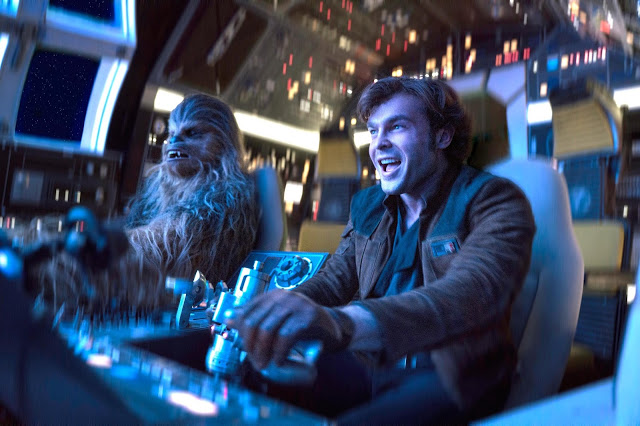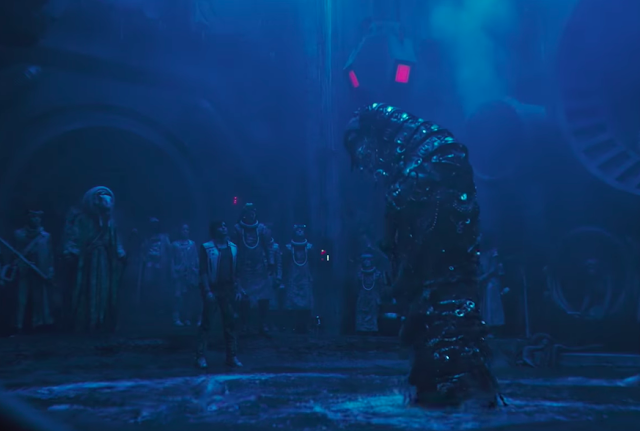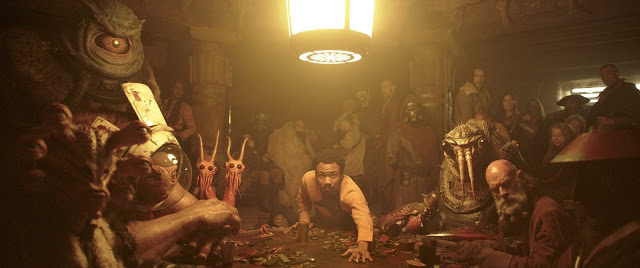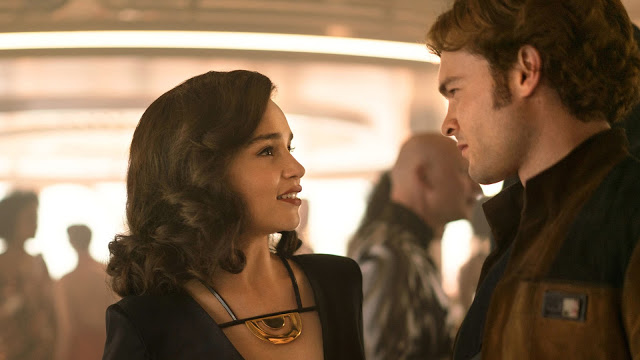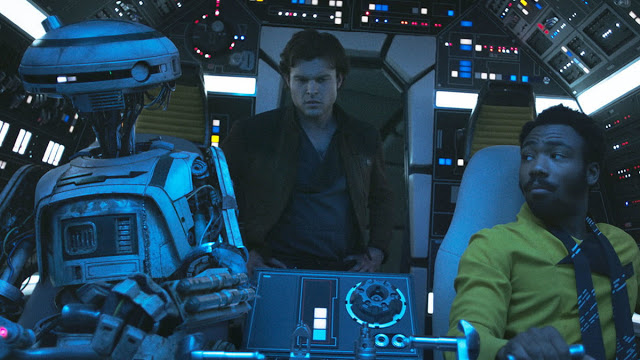There’s a quick shot in Solo: A Star Wars Story of someone in a spacecraft sliding into the copilot’s seat, ready to help guide the ship out of danger. Taken in a vacuum, it’s an unremarkable image, just a basic establishing shot of the type we’ve seen in countless sci-fi films. But while this fun and frisky movie may take place in outer space, it most certainly does not take place in a vacuum. Instead, it is set within the Star Wars mythos, which means that the pilot is a cocksure grifter named Han Solo, the copilot is a gigantic walking carpet called Chewbacca, and the spaceship is none other than the Millennium Motherfucking Falcon. And for viewers of a certain generation, the image of Han and Chewie sitting side by side in the cockpit of one of the fastest ships in the galaxy carries with it a frisson of elation, because we are witnessing not just the usual collaboration of roguish outlaws, but the birth of a partnership that served as a cultural touchstone of our youth.
This is almost unfair. By telling a story about characters I grew up with, Solo is capable of hard-wiring into my lizard brain, remapping my neural pathways and convincing me that it’s a good and meaningful movie simply by reason of its existence. So perhaps the happiest surprise about Solo is that it does not coast along entirely on nostalgia. There is some of that, sure—hey, do those dice look familiar? What’s that adage about Wookiees pulling people’s arms out of their sockets?—but there is also a breezy sense of adventure, along with a winning atmosphere of wonder and discovery. By and large, the film gets by on its own merits; there’s no mystical energy field that controls its destiny.
Or at least, the Force that’s guiding Solo—an intergalactic behemoth by the name of the Walt Disney Company (or maybe it’s Lucasfilm? Sorry, it’s hard to keep track)—handles its corporate property with a relatively light touch. Directed by Ron Howard from a script by Jonathan and Lawrence Kasdan, the movie may not be especially risky (and it certainly became less so, once original directors Phil Lord and Christopher Miller were removed for the dreaded “creative differences”); it flies through space with the methodical precision of a Star Destroyer rather than the improvisational whimsy of the Falcon itself. But Howard still locates room for invention and playfulness to go with his typically sturdy stewardship.
It does take him some time to find his space legs. Solo’s opening act is its rockiest, as our introduction to Han (Alden Ehrenreich, pretty good once you acknowledge that he isn’t Harrison Ford) is something of a tonal mishmash. Han is a striving street rat on the crime-infested planet of Corellia, hoping to scrounge together enough cash to bribe his way out off this rock along with his girlfriend, Qi’ra (Emilia Clarke, icy-hot). There’s promise in the material—Han serves a Jabba-esque gangster called Lady Proxima (voiced by Linda Hunt), a CGI villain who looks like a cross between a basilisk and a giant worm—but the scenes are pitched off-key, tumbling between light Western-style antics and solemn, overwrought gravity. It doesn’t help that the film appears to have been layered with a dark, slate-blue tint, dimming the image and dulling any sense of alluring possibility. (After conferring with other viewers, it may be that this patina stemmed from poor projection quality at my local multiplex, though I’ve seen similar complaints online.)
Fortunately, once Han blasts off into space, Solo itself starts picking up steam. Structurally, the movie operates as a series of daring criminal episodes, a string of scams, gambits, and perilously close shaves. What’s impressive is how adroitly Howard balances the demands of the genre—the movie is replete with scenes of sci-fi spectacularism and heroic derring-do—with a screenplay that piles on the conflict, a maze of shifting allegiances and sudden double-crosses. At 135 minutes, Solo packs in a lot of story, but it never feels long, a testament to Howard’s able command of plotting and pacing.
It helps that he’s assembled a lively rogues’ gallery of supporting characters. It is inevitable that Han will strike up an interspecies friendship with Chewbacca (Joonas Suotamo), and while it remains dubious that Han can understand the fuzzball’s throaty language—he even emits some Kashyyykian warbles of his own at one point—their pairing is a reliable source of verbal and visual amusement. Equally inevitable, and maybe more intriguing, is Han’s run-in with Lando Calrissian (Donald Glover, slick and silky), that caped, dapper smoothie with a honeyed tongue and opaque motives. The Han-Lando relationship was among the most potent threads in The Empire Strikes Back, and here it’s appropriately tentative, the two young hotshots circling each other with a mixture of antipathy and curiosity.
Of course, Chewie and Lando are already woven into the Star Wars fabric; their mere appearance is enough to get my spine tingling. But Solo’s newbies are also compelling, and perfectly cast. Woody Harrelson and Thandie Newton show up as the Becketts, a pair of crafty crooks who rely on stealth and deception to accomplish their ends; Harrelson’s character in particular is wonderfully jaded and amoral, and it’s possible to see Han aging into this grizzled cynic in a universe where he doesn’t happen to cross paths with Luke Skywalker. (The Becketts’ crew also includes a four-armed alien voiced by Jon Favreau, whose broad vocal stylings prove an awkward fit.) Paul Bettany oozes slime as a literal red-faced heavy with the appropriately sinister name of Dryden Vos. And while it’s law that every Star Wars movie must contain a comic-relief droid, there’s something downright delightful about Lando’s cohort L3 (Killing Eve creator Phoebe Waller-Bridge), a sarcasm-spewing machine with a proud political agenda; her loaded response to a token question from Lando, and his pained reaction in return, is the funniest moment in the film.
At the center of everything, obviously, is our titular scoundrel. Han is posited here as a brave and competent pilot, but it’s his mouth that’s constantly getting him into and out of trouble, which is why Ehrenreich’s performance is so crucial. On the whole, the young actor—who presumably earned the part following his tremendous turn in Hail, Caesar!—fares well. His line readings can be stiff on occasion—the pitch of his voice seems to fluctuate unnecessarily—but he brings a confidence to the role that feels correct for a young Han, just the right combination of outsized bravado and boyish naïveté.
That quality of innocence complicates the movie’s most interesting relationship, which is the romance between Han and Qi’ra (pronounced “Kira”), who has separately acquired disreputable work as Vos’ top lieutenant. Their alchemy is a curious thing; Clarke’s chilly reserve clashes nicely against Ehrenreich’s jocular swagger, but the love story itself—initially framed as a swooning saga of passion and destiny—never really feels like a grand romance.
Which may well be the point. Everyone seeing this movie knows that years from now—really, years ago—Han will fall in love with Princess Leia, and in the process transition from scruffy-looking nerfherder to dashing freedom fighter. As a result, any coupling that this version of Han experiences will necessarily feel lesser in terms of intensity and longevity.
This is the fundamental challenge of prequels: the need to tell an exciting new story while dutifully respecting the existing canon. Yet while Solo carefully nestles itself inside Lucasfilm’s broader mythology—the late appearance of a fan favorite will have some Star Wars historians crying retcon-foul, though I was too thrilled to care—the majority of the movie is gratifyingly self-contained. Even more so than the prior prequel, the strikingly gloomy Rogue One, Solo is largely content telling its own story, a jaunty and twisty caper that’s more concerned with assembling its own puzzle pieces than with how they fit into a faraway galaxy.
More importantly, it’s just kind of fun. There’s a certain silliness to it—as in the faux-suspenseful poker sabacc games between Han and Lando, or the slave revolt that L3 instigates on a mining colony—that’s endearing rather than cheesy. It’s certainly possible to envision the quasi-comedy that Lord and Miller purportedly intended to make, and while Howard is far too straitlaced a filmmaker to allow the proceedings to slide into subversive territory, he still taps into veins of humor and lightness that complement the film’s overall spirit of adventure.
Whether Solo is a great action movie is another matter. As a director, Howard plainly lacks the visual panache that Rian Johnson brought to The Last Jedi (though he does provide one especially memorable image: the glint of a red lightsaber reflected in a woman’s eye), and his interstellar battles aren’t as dynamic as the dogfights of The Force Awakens. But despite (or perhaps because of) his limitations, Howard brings some welcome clarity to all of the laser-powered mayhem, most notably during an early heist sequence that proves to be a genuinely great train robbery. The obligatory Kessel run is less stimulating—and if you don’t know what the Kessel run is, I’m amazed you’re even here—but at least Howard doesn’t assault his viewers with relentless FX-driven spectacle, preferring to foreground his characters.
It has become fashionable, in recent days, to pooh-pooh the Star Wars franchise, to dismiss it as the mercenary product of a greedy corporate empire. There’s some truth in this charge; Disney does want to make money, after all. But the profit motive doesn’t automatically foreclose artistic accomplishment, and Solo proves it’s possible for a talented cast and crew to make an entertaining and agile movie that still satisfies their employer’s rigorous demands. That’s a tricky challenge, but there’s never been any point in telling Han Solo the odds.
Jeremy Beck is the editor-in-chief of MovieManifesto. He watches more movies and television than he probably should.

